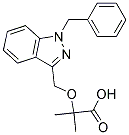All AbMole products are for research use only, cannot be used for human consumption.

Bindarit is an original compound with peculiar anti-inflammatory activity due to a selective inhibition of a subfamily of inflammatory chemokines, including the monocyte chemotactic proteins MCP-1/CCL2, MCP-3/CCL7, and MCP-2/CCL8. Bindarit inhibits the LPS-induced MCP-1 and IL-12β/p40 expression without affecting other analyzed cytokines. Bindarit showed a specific inhibitory effect on the p65 and p65/p50 induced MCP-1 promoter activation, with no effect on other tested activated promoters.
In vitro, bindarit can modulate cancer-cell proliferation and migration, mainly through negative regulation of TGF-β and AKT signaling, and it can impair the NF-κB signaling pathway through enhancing the expression of the NF-κB inhibitor IkB-α.
In vivo administration of bindarit results in impaired metastatic disease in prostate cancer xenograft mice (PC-3M-Luc2 cells injected intra-cardially) and impairment of local tumorigenesis in syngeneic Balb/c mice injected under the mammary gland with murine breast cancer cells (4T1-Luc cells). Treatment of rats with bindarit (200 mg/kg/day) significantly reduced balloon injury-induced neointima formation by 39% at day 14 without affecting re-endothelialization and reduced the number of medial and neointimal proliferating cells at day 7 by 54 and 30%, respectively. In addition, in vitro data showed that bindarit (10-300 microM) reduced rat vascular smooth muscle cell (VSMC) proliferation, migration, and invasion, processes contributing to the injury-induced neointima formation in vivo.
| Molecular Weight | 324.37 |
| Formula | C19H20N2O3 |
| CAS Number | 130641-38-2 |
| Solubility (25°C) | DMSO 45 mg/mL Ethanol 30 mg/mL |
| Storage |
Powder -20°C 3 years ; 4°C 2 years In solvent -80°C 6 months ; -20°C 1 month |
| Related CCR Products |
|---|
| C-021 dihydrochloride
C-021 dihydrochloride is a potent CC chemokine receptor-4 (CCR4) antagonist. C-021 dihydrochloride potently inhibits functional chemotaxis in human and mouse with IC50s of 140 nM and 39 nM, respectively. |
| C-021
C-021 is a potent CC chemokine receptor-4 (CCR4) antagonist. C-021 potently inhibits functional chemotaxis in human and mouse with IC50s of 140 nM and 39 nM, respectively. |
| AZD-5672
AZD-5672 is an orally active, potent, and selective CCR5 antagonist (IC50=0.32 nM). |
| MLN3126
MLN3126 is an orally active and potent CCR9 antagonist. |
| AZD2423
AZD2423 is a potent, selective, orally bioavailable, and non-competitive CCR2 chemokine receptor negative allosteric modulator. |
All AbMole products are for research use only, cannot be used for human consumption or veterinary use. We do not provide products or services to individuals. Please comply with the intended use and do not use AbMole products for any other purpose.


Products are for research use only. Not for human use. We do not sell to patients.
© Copyright 2010-2024 AbMole BioScience. All Rights Reserved.
